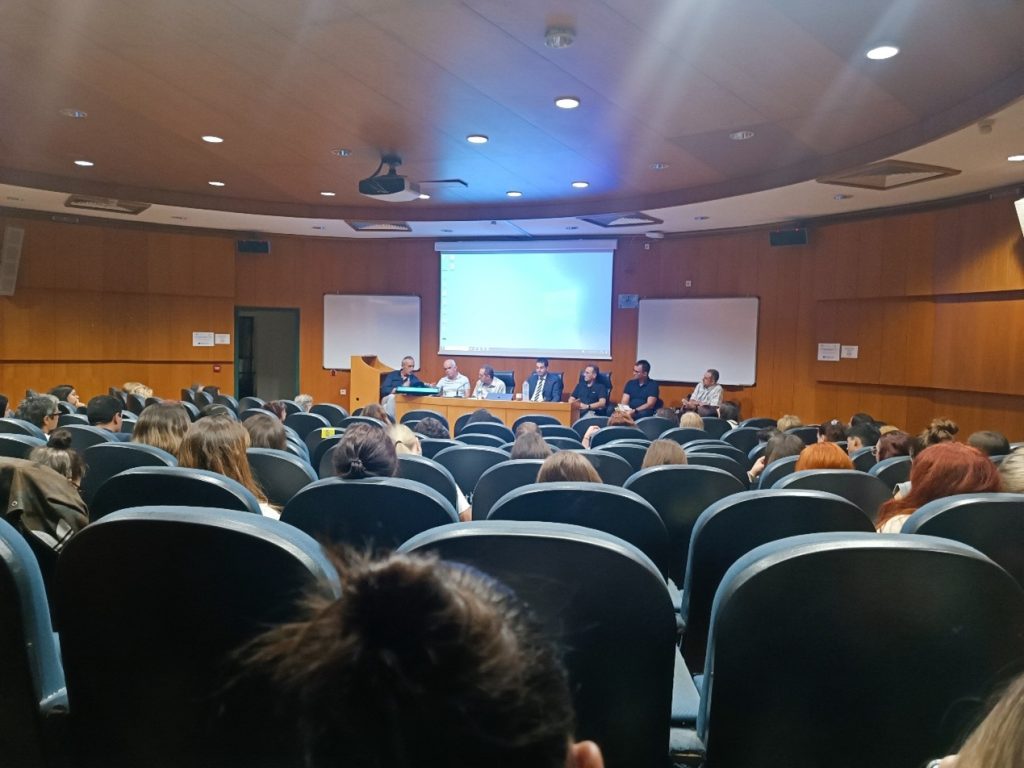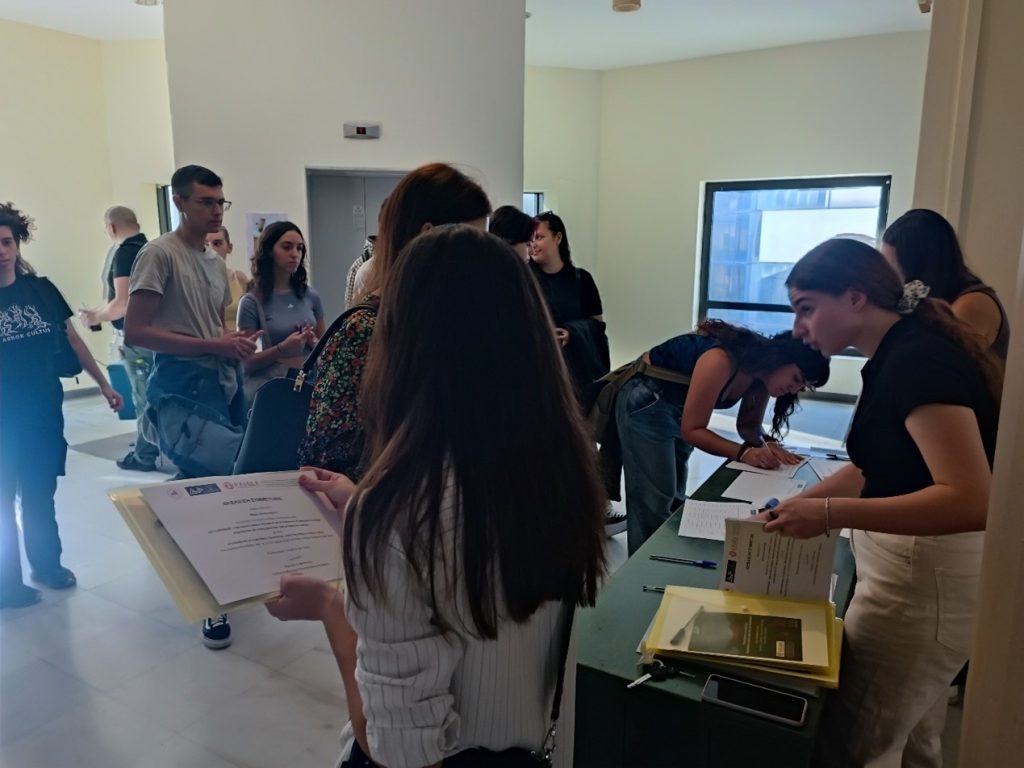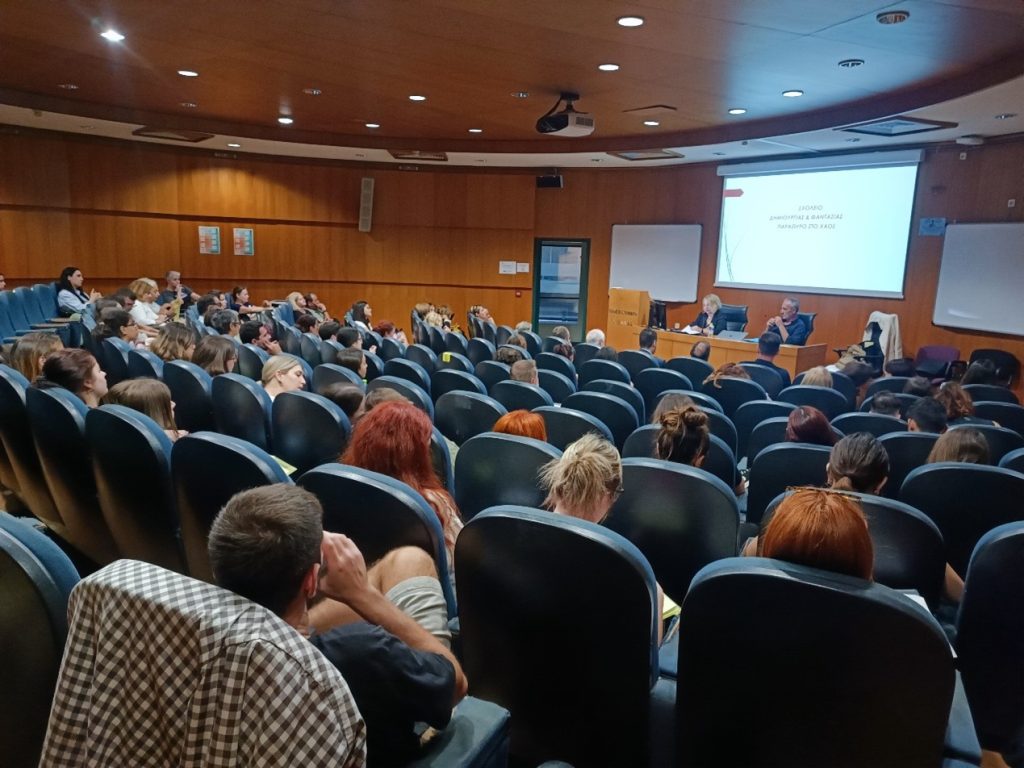NewsLetter #5
24 NOV 2024
01
The performance
After the completion of the workshops in the framework of the theatre-pedagogical approach, rehearsals followed from 25 April to 20 June in order to present the theatrical text in the form of a performance. The rehearsals enabled a) deeper practice of each individual’s role, b) better connection with the content of the story, c) creation of close bonds between the members of each scene and d) creation of a common goal for all the members of the group. In the preliminary rehearsal, emphasis was placed on the set design and the choice of costumes and musical scoring. In the dress rehearsal, emphasis was placed on the set design and repositioning of the actors as we moved from the rehearsal space to the theatre presentation room. The actors’ entry and exit points were marked there, and the microphones and logistics were checked. On the day of the performance, the above workshops were disseminated through the presentation of the play to a packed hall with other inmates, teachers and prison staff.
02
ICME 15-International Congress on Mathematical Education
07-14/07/2024
Charoula Stathopoulou in the framework of ICME 15-International Congress on Mathematical Education (7-14 July 2024 at International Convention Centre in Sydney, Australia) participated in the Topic Study Group on Ethnomathematics and First Nations/Indigenous people’s mathematics and mathematics education. She presented the paper: “A BOTTOM-UP CURRICULUM TOGETHER WITH YOUNG PRISONERS – (ACTinPRISON)” shared with Ioannis Fovos, Vasiliki Chrysikou, Peter Appelbaum. The paper provided information on the efficacy of a dialogic methodology and mathematics literacy development for the empowerment of young prisoners. Co-creating and co-researching life history and current motivations with mathematics created a pedagogical space compatible with Ethnomathematics (EM), engaging learners and promoting the use of mathematics for recognition.
Moreover, Peter Appelbaum participated in the Topic Study Group on Ethnomathematics and First Nations/Indigenous people’s mathematics and mathematics education. He presented the paper “THEATER EDUCATION REPLACES PUBLIC SPACE WITH COMMON SPACE IN PRISON MATHEMATICS EDUCATION” shared with Maria Karazanou, Vasiliki Chrysikou, Charoula Stathopoulou. In the paper the experience of creating common spaces with young inmates and prospective teachers within the framework of the ACTinPRISON project was presented. It focuses on the use of drama in education and Critical Communicative Methodology (CCM) created a space that encouraged all the participants to become co-researchers. Developing mathematical ideas while using the same time drama techniques, a framework of familiarity and care were built supporting recognition and acceptance. This pedagogical framework seems to actively encourage meaningful transformation as observed by co-researchers and as expressed by inmates themselves.


03
Educational Policy/ies: Recommendations
During the reporting period the research team completed an investigation of existing policies, based on which Prison Education might be regarded as having a strategically strong position in legislative framework. Based on this report, numerous institutional texts, wide variety of organizations and Erasmus+ projects call on states around the world to follow a series of practices to guarantee the human rights of inmates.
Moreover, the research team completed the theoretical framework for prison education integrating alternative forms of education. As education in prisons plays an important role, numerous positive outcomes that relate to inmates’ participation in education during a detention period are highlighted. The benefits of learning in traditionally non-educational activities are several. Informal curricular activities can support any literacy while they encourage inter-subjectivity, the use of interdisciplinary methods and teaching in combined student groups. Τhe utilization of alternative language literacies, mathematics literacies, digital literacies, and theatre education in prisons aim to make a theoretical framework that seeks to have immediate implications for educational praxis and inform policies and decisions’ makers.
Also, during this period, the research team is working on the formation of Status & Corpus planning recommendations.
04
Final Conference of ACTinPRISON entitled “Prison Education: Challenges, good practices and prospects”
At the conference, which took place on October 14th and 15th, 2024 at the University of Thessaly in Volos, the results of the ACTinPRISON project were presented while prospects and possibilities for further actions in the field of education of young prisoners were explored. More than 150 people attended live the Conference. We believe that the conference achieved its goals by giving, on the one hand, the team members the opportunity to share their experience and results from the implementation of the project and, on the other hand, a space for discussion and stakeholder engagement in proposals for prison education with the ultimate goal of the social reintegration of young prisoners after their release.





The research project was supported by the Hellenic Foundation for Research and Innovation (H.F.R.I.) under the “2nd Call for H.F.R.I. Research Projects to support Faculty Members & Researchers” (Project Number: 4164)
